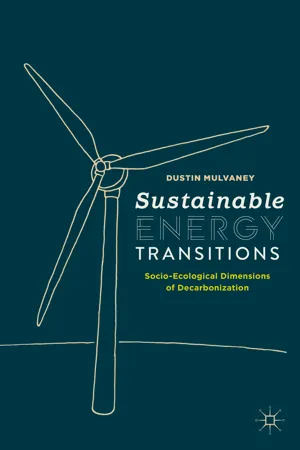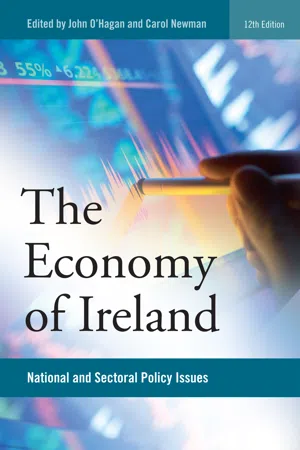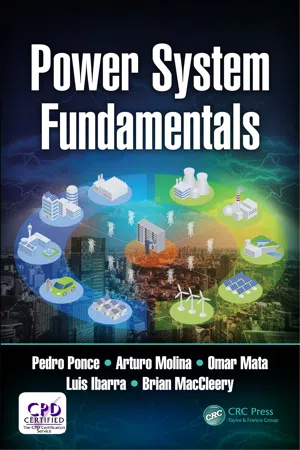Physics
Big Energy Issues
Big energy issues in physics encompass topics such as energy conservation, energy transfer, and the various forms of energy, including potential, kinetic, and thermal energy. These issues also involve understanding the laws of thermodynamics, energy sources and transformations, and the impact of energy use on the environment. Addressing these challenges is crucial for advancing our understanding of the fundamental principles governing the universe.
Written by Perlego with AI-assistance
Related key terms
1 of 5
3 Key excerpts on "Big Energy Issues"
- eBook - ePub
Sustainable Energy Transitions
Socio-Ecological Dimensions of Decarbonization
- Dustin Mulvaney(Author)
- 2020(Publication Date)
- Palgrave Macmillan(Publisher)
Throughout this chapter, there are example problems that review energy-to-power relations, unit conversions, and stoichiometry, in addition to a handful of empirical problem sets and assignment. The chapter ends with a discussion about how concepts like entropy can provide a scientific basis for understanding how natural resource use has implications for intergenerational equality—the idea that resources must be managed for future generations (Costanza et al. 2014). 2.1 Power and Energy Energy is fundamental stuff. It is what allows life to occur, through metabolism and eventually decay. It shapes where non-living things are and where they are going. As the property of a star, the amount of energy determines whether humans could eventually inhabit those places. Energy also enables humans to develop the societies that exist today, and the linkages between peoples, economies, and nature in different parts of the world. Vaclav Smil describes energy use by human civilization as its metabolism—borrowing a metaphor for how living organisms process energy to fuel their needs and wants. What is energy? From your biology, physics, or chemistry classes in school you may recall that energy is the ability to do work or the ability to transform a system. Energy is encountered in different forms, but most often its presence is suggested by motion, activity, light, heat, or change. As a fundamental law of the universe, energy is always conserved. The energy that was present at the start of the universe is all still in the universe. This means energy cannot be created, only converted and transformed. Energy is a discrete quantity. This makes it different than power, which is a flow rate quantity of energy. Energy is the amount of power over time measured in joules (J) - eBook - ePub
The Economy of Ireland
National and Sectoral Policy Issues
- John W. O'Hagan, Carol Newman, John W. O'Hagan, Carol Newman(Authors)
- 2014(Publication Date)
- Gill Books(Publisher)
CHAPTER 10 Energy Sector and Environmental IssuesEleanor Denny1 INTRODUCTIONEnergy and the environment are strongly interlinked and are critical policy concerns for governments around the world. Energy plays a role in almost every facet of society, from industry to transport to domestic use, yet it is also responsible for over 80 per cent of global greenhouse gas emissions. The environment is a strategic and valuable asset and as such it must be protected and proactively managed to ensure that it forms the basis of economic welfare and a healthy society. Balancing these two, often competing, policy agendas is at the crux of global energy policy and will be the focus of this chapter.Since the 1800s the role of energy in modern society has evolved and today energy is an essential input into almost every aspect of daily life, both for consumption and as an input to production. From lighting, heating and transport at the residential level to production processes, IT systems, communications networks, and retail and services provision, energy is considered a vital necessity without which any developed economy would grind to a halt. In fact, a reliable and safe energy supply at a sustainable cost is considered a basic necessity for economic development.Ensuring a secure energy supply also has a critical political aspect, from a local perspective, with the development of national energy projects and infrastructure, to high-profile international politics. Conflict over the control of valuable oil supplies has been a persistent feature of international affairs since the beginning of the 20th century. Such conflict varies in nature, from territorial disputes over the possession of oil-laden regions to struggles among the leaders of oil-rich countries to major inter-state wars over the control of vital oil zones. As oil reserves continue to be depleted, the frequency and severity of such conflict is likely to increase. - eBook - ePub
- Pedro Ponce, Arturo Molina, Omar Mata, Luis Ibarra, Brian MacCleery(Authors)
- 2017(Publication Date)
- CRC Press(Publisher)
8Renewable Energy
The provision of energy or related energy services involves a huge variety of environmental impacts that are increasingly less tolerated by society. This is why the energy problem in conjunction with the underlying environmental problem continues to be a major topic in energy engineering, as well as in the energy and environmental policies around the world. From the current viewpoint, this attitude is not expected to change within the near future; the worldwide controversy about the potential risks of the anthropogenic greenhouse effect is only one example. On the other side, in view of the increasing knowledge and recognition of the effects associated with energy utilization in the broadest sense of the term, increasing complexity has to be expected.According to Max Planck, energy is defined as the ability of a system to cause external action. Many forms of energy are distinguished: mechanical energy, thermal, electric and chemical energy, nuclear energy, and solar energy. In practical energy appliances the ability to perform work becomes visible by force, heat, and light. The ability to perform work from chemical energy, as well as nuclear and solar energy, is only given if these forms of energy are transformed into mechanical and thermal energy.The term energy carrier, thus a carrier of the above-defined energy, is a substance that could be used to produce useful energy, either directly or by one or several conversion processes. According to the degree of conversion, energy carriers are classified as primary or secondary energy carriers and as final energy carriers, explained below:- Primary energy carriers are substances that have not yet undergone any technical conversion, whereby the term primary energy refers to the energy content of the primary energy carriers and the primary energy flows. From this energy, a secondary energy carrier can either be produced directly or by one or several conversion steps.
Index pages curate the most relevant extracts from our library of academic textbooks. They’ve been created using an in-house natural language model (NLM), each adding context and meaning to key research topics.


